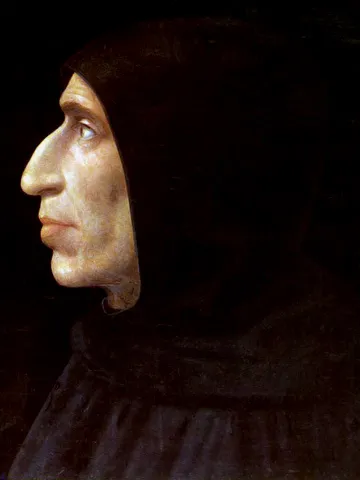
Name: Girolamo Savonarola
Geburtsjahr: 1452
Nationalität: Italienisch
Beruf: Theologe und Politiker
Bekannt für: Seine religiösen Reformen und politischen Aktivitäten in Florenz
Girolamo Savonarola: Theocratic Reformer and Controversial Figure of the Renaissance
Girolamo Savonarola, born on September 21, 1452, in Ferrara, Italy, was a Dominican friar, theologian, and a significant political figure during the late 15th century. He is well known for his fervent preaching against corruption within the Church and society, which ultimately led to him becoming a prominent voice during the tumultuous era of the Italian Renaissance.
Early Life and Education
Savonarola was born into a well-educated family. His father worked as a physician, which allowed Savonarola access to a robust education. He entered the Dominican Order at the age of 23, drawn to its emphasis on preaching and theological study. Savonarola pursued his studies in Bologna, where he developed his religious convictions and began to form his critical views on the moral decline he perceived within the Church.
Rise to Prominence
By the 1490s, Savonarola had moved to Florence, where he gained a following due to his vehement sermons that criticized the moral decay of the society, including the ruling Medici family. His charisma and eloquence drew many followers, and he soon became the city's leading spiritual guide.
In 1494, following the expulsion of the Medici family from Florence, Savonarola played a crucial role in the establishment of a theocratic government. Under his leadership, the city embraced a strict interpretation of Christian morals, with significant impacts on culture and society. His followers enacted various moral reforms, such as banning gambling, prostitution, and public displays of luxury.
The Bonfire of the Vanities
One of the most infamous events associated with Savonarola was the 'Bonfire of the Vanities' in 1497, where he encouraged Florentines to burn objects associated with sin, such as books, art, and cosmetics. This act symbolized his campaign against the perceived moral corruption of the time, as well as his disdain for Renaissance humanism, which celebrated the individual and worldly pleasures.
Conflict with the Papacy and Downfall
Savonarola's growing influence and criticism of the Pope led to increasing tension with the Vatican. Pope Alexander VI, who represented the corruption within the Church, considered Savonarola a dangerous figure. In 1497, the Pope excommunicated Savonarola, which only intensified his resolve to challenge the established order.
By 1498, the tide began to turn against Savonarola and his regime. Rising opposition from political factions in Florence led to a loss of support. In April 1498, he was arrested, and after a series of trials, he was executed on May 23, 1498. His death marked the end of the theocratic rule he had established in Florence.
Legacy
Though controversial, Savonarola’s legacy continues to evoke interest and debate. He is often viewed as a precursor to later reformers who criticized the Church. His commitment to moral reform and his critiques of corruption remain relevant today, as they echo the ongoing struggles within religious institutions.
Girolamo Savonarola's life is a compelling narrative of faith, power, and moral conviction that highlights the complexities of the Renaissance era. While his methods may be contested, his impact remains a significant chapter in the history of religious and political reform in Italy.





